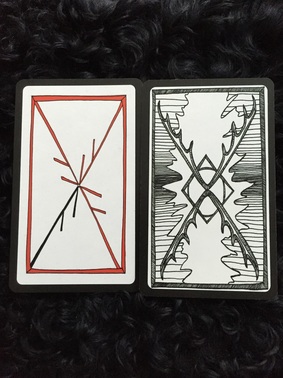|
I dance with Ansuz in my relationship with words. Words are alive and have an existence separate and distinct from the way we mindlessly use them. They’re creations in and of themselves. They have a generative power. True, they may limit us when we use them to describe what we experience as reality but at the same time they have the power to change our perceptions as well as create.
The psychologist James Hillman wrote about the ‘angelology of words’. The word angel originally meant an emissary or a messenger and the Ansuz rune helps me remember the value and significance of what words carry between people. Words as well as runes are personal presences with their own gender, history, mythology and genealogy. Words and runes are about voice and sounds. How do you use your voice? It’s not a matter of whether or not you talk. It’s a matter of whether or not you use your voice to speak about things of value, and whether you use your voice to speak of things with integrity and truth. We become out of balance with Ansuz if we engage in gossip, idle and unconscious speech and lying. And once we’re out of balance with Ansuz we become out of balance with our breath because breath is the means by which we speak. And breath is about life. We no longer live in an oral culture so a good question to ask might be whether or not Ansuz can connect to our writing voice as well as our speaking voice. Ansuz is about air. Just like fish live in water, we as humans live in air. It’s easy to forget that because air is invisible. We may enter a room and say that it’s empty because we don’t see anything in it but the room is not empty. The air is there so the room is full and the air is always full of things seen and unseen. Air is all around us and air is inside of us. We are the container. We are the contained. The being of Ansuz also connects us to the ash tree, sometimes called the honey tree because it secretes a sugary substance from its bark and leaves. This honey from the ash tree, when fermented, has hallucinogenic effects on those who consume it. Called the mead of the gods it opens up the way for us not only to have communion with the gods but also to speak in their voice. It’s said that it was a custom in the Scottish Highlands for mother’s to give to their newborn infants, on the tips of their fingers, the fermented sap of the ash tree, thus linking them to the gods from the moment of their birth. How different might things be if we still followed such practices today? The presence of Ansuz may also ask you to call into question your thoughts and beliefs about the use of hallucinogenic substances in ritual. Can they, do they, connect you with the gods and the power of words to create? When we take an in-breath, do the gods of the air breathe into us at the same time? And if that’s the case, is the air we expel when we speak, also the spirit, breath and voice of the gods? Whose breath mingled with Odin’s breath when he saw the runes, grabbed them up and screamed? Is that what’s meant by a sacrifice of self to self? What is created at the time of sacrifice? Ansuz might also lead you to Bragi, the Old Nose god of poetry and eloquence who is said to have had the runes carved on his tongue. Poetry carries the magical power of words. It can touch our hearts, stir up memory and longing as well as inspire. It allows us to partake of the realm of the gods through the use of words. It was and still can be used as a memory aid to keep alive the tales of the gods, to take hold of the woven, unbroken ancestral lines that are constantly being twisted by breath.
0 Comments
|
title Photo by Amaury Gutierrez on Unsplash
IngridWriters write. Archives
January 2022
Categories
All
|

 RSS Feed
RSS Feed